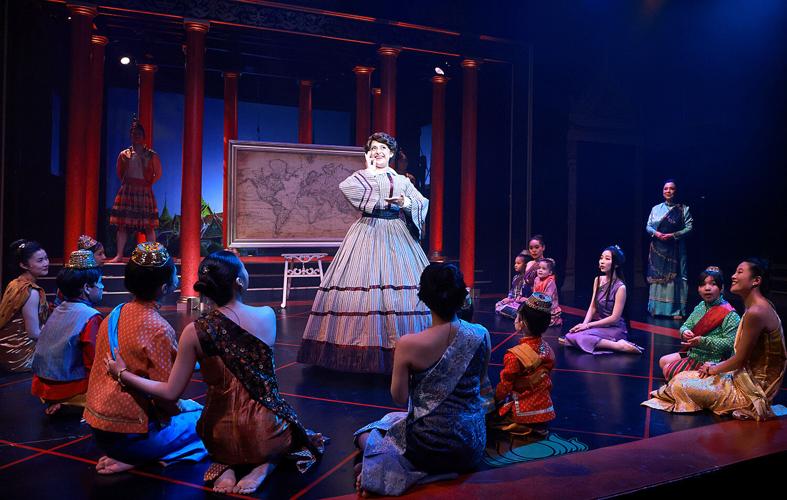INDIANAPOLIS — If one views “The King and I” in the light of its on-stage time period — 1862 — there can be emotional connections to the now-73-year-old musical.
The tale of an often-contentious relationship between a British schoolteacher and King Mongkut in Siam was adapted by Richard Rodgers and Oscar Hammerstein II, debuting on Broadway in 1951.
Contentious at their first meeting of prim teacher and imposing king, yes, but the story does give us the songs “Hello Young Lover,” “Getting to Know You” and “Shall We Dance,” sweetly presented through May 19 at Beef & Boards Dinner Theatre.
The songs are tied together by characters running afoul of social mores.
Mostly though, the five-member orchestra conducted by Kristy Templet brings the needed musical unity to this production. There are standout moments when keyboards sound like a relaxing Asian night and percussion proudly announces dignified arrivals.
Set in 1862, the musical confronts forced servitude in Asia in contrast to the slavery debate in the United States and Britain. Siam, in the midst of political talks with Britain, is confronted with he tradition of a king’s demand for respect: all of his subjects must bow and no woman can stand taller than the king.
Hannah Louis Fernandes as teacher Anna Leonowens has nicely-crafted moments of irritation with King Mongkut, played with often-humorous delivery by Jae Woo.
Praise should be given to the too-brief appearances by Alice Jihyun Kim and Yu Hin Bryan Chan as young lovers breaking the customary bonds imposed by King Mongkut. Their voices blend effortlessly on “We Kiss in a Shadow” and ”I Have Dreamed.”
“The King and I” is an ambitious mess of ideas, taking on enslavement, machismo and equality of the sexes but never finding a suitable answer. At best, in the finale, the new young king ends the subservient practice of crawling before the king (which isn’t articulated clearly in this production). Oh well, it’s a start, at least in 1862.
Beef & Boards has also brought in an international cast originally from South Korea, Japan, the Philippines, Hong King and Thailand (where “The King and I” has been banned for years).
By the way, as we’re told, a solar eclipse led to the death of the real King Mongkut. He traveled to a village to see the Aug. 18, 1868 eclipse. He was bitten by malaria-carrying mosquitos and died. In the musical, Mongkut dies of old age; there’s no threat of mosquitos.
Over 2 hours and 45 minutes, including intermission, this production is directed with commitment by Brian Jose, who writes in the program that his message is to emphasize “cultural understanding and the struggle to come to terms with our own personal connection to our history and heritage … ”
Amid current culture wars, Jose finds “a show about exploring our differences and attempts to understand each other seems like just what we need.”
His words go a long way to help appreciate this production.











